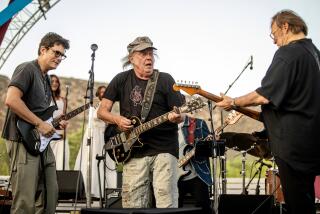Neil Young fights for quality streaming with career-spanning online archive

One of the elements of Neil Young’s latest online music endeavor is a virtual meter at the top of the screen that looks and functions like a speedometer.
When any one of hundreds of available songs are pulled up out of a virtual file cabinet and played, the listener can watch the dial bounce back and forth as though motoring along an aural highway, the numbers running from a few hundred to the high 4,000s and low 5,000s.
What Young and his team have built in to share with archive visitors is the streaming rate at which songs are played back, numbers that are markedly higher than the standard streaming speed of 320 kilobits per second.
Techno-geek land? Well, yes. But that’s a drum he’s been beating throughout his career. Now with the Neil Young Archives, which launched Dec. 1 and is free for the first six months, Young aims to to demonstrate what’s possible for music streaming today, by way of his own streaming platform, called Xstream..
“The thing is, I want the sound of music to come back — and it’s gone,” Young, 72, said while seated in a large, rustic chair in the front room of the Calabasas home of his longtime manager, Elliot Roberts. “CDs have less than 20% of the quality that music could be, and MP3s in most cases have only about 5% of what’s on the master recording.”
The archive also has a virtual switch next to the virtual meter that allows users to change the playback speed to standard internet streaming service speed, something visitors also can use if their internet service doesn’t have sufficient bandwidth to accommodate the full-speed version.
The difference is quickly perceptible. Young likens basic streaming to looking at a grand landscape through a dirty window. Cleaning the window is the equivalent of a CD, while a full-fidelity master recording is akin to opening the window.
“It blows my mind what has happened right in front of us,” said Young. He has previously released his music in high-quality audio formats such as high-definition CDs (HDCDs) and on Blu-ray audio with the 2010 physical version of the first volume of his long-term archive release project.
More recently, he set up his own high-resolution digital music store and playback system, Pono, which he shuttered last April about five years after introducing it.
Pono hit several roadblocks. It entered the market at a time when consumers were rapidly moving away from owning music and jumping to streaming services such as Spotify. Consumers also were shifting away from stand-alone players like iPods and using their smartphones to manage their music choices.
But for Young, the biggest hurdle for Pono was monetary.
“The record labels killed it,” he said. “They killed it by insisting on charging two to three times as much for the high-res files as for MP3s. Why would anybody pay three times as much?”
Although he said that users downloaded more than 1 million high-resolution audio tracks from Pono, ultimately there wasn’t sufficient momentum, or financial success.
“It’s my feeling that all music should cost the same,” he said. “The [high-resolution] file doesn’t cost any more to transfer. And today with streaming, you don’t have the problem [of unauthorized file sharing]. Who wants to copy something if you can stream it?
“The record companies, by charging three times as much for hi-res music as they charge for regular music, they’ve killed hi-res music,” he said. “It’s the dumbest thing I’ve ever seen.”
Sonic fidelity is a big part of Neil Young Archives, but the rest of the site is created with similar attention to, and passion for, quality.
It’s organized like an old metal file cabinet — complete with audible clicking and thunking of drawers. Virtual folders house music and memorabilia for each of Young’s studio and live albums as well as rare tracks and unreleased material.
Within the folders are sub-folders for individual songs, often containing hand-scrawled lyrics, where Young aficionados will find that the original opening line of his song “Cinnamon Girl” was “I wish to marry a Cinnamon Girl,” a line that soon morphed into “I want to live with a Cinnamon Girl.”
There’s also an interactive timeline that lets users discover when Young played his first show in the U.S. — Oct. 30, 1965, at the Wobbly Barn in Killington, Vt. — or the date “when Geffen Records sued [Young] for making music unrepresentative of himself (Dec. 1, 1983).” .
A search function quickly calls up a half-dozen different renditions of “Sugar Mountain.”
“All I can do is take care of my music, so that’s what I’m doing,” he said.
The site does offer those still old-school enough to want to download songs or albums a mechanism for doing so, with hi-res versions selling for around $23 per single album — something Young said he would change if he could negotiate a lower price with the music conglomerates he’s working with.
Not everything Young has released is up yet in high-resolution — notably his five ’80s albums for Geffen Records, and the Buffalo Springfield box set — making it something of an ongoing work in progress. “We’ll be continually adding content as it becomes available,” manager Roberts said.
At the six-month mark, Young says he’ll introduce a couple of levels of subscriptions for those who want continued access. Casual visitors will still be able to explore many aspects of the archive for free, but streaming will be limited to subscribers.
“This isn’t really a streaming service, because it’s just me and my music,” he said.
“There’s nothing stopping anybody else from doing this,” he continued. “The record companies are in the way with the high prices. There should be hi-res streaming services everywhere.”
Follow @RandyLewis2 on Twitter.com
For Classic Rock coverage, join us on Facebook
More to Read
The biggest entertainment stories
Get our big stories about Hollywood, film, television, music, arts, culture and more right in your inbox as soon as they publish.
You may occasionally receive promotional content from the Los Angeles Times.










